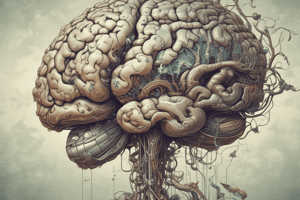Podcast
Questions and Answers
What is storage in the context of memory?
What is storage in the context of memory?
The process of retaining encoded information over time.
What is memory capacity?
What is memory capacity?
Our capacity for storing long-term memories is essentially limitless.
What is explicit memory?
What is explicit memory?
- Memory of unconscious procedures
- Retention of learned skills
- Memory of facts and experiences one can consciously know (correct)
- Memory associated with emotional events
What role does the hippocampus play in memory?
What role does the hippocampus play in memory?
What is implicit memory?
What is implicit memory?
How do emotions affect memory?
How do emotions affect memory?
What are flashbulb memories?
What are flashbulb memories?
What is long-term potentiation (LTP)?
What is long-term potentiation (LTP)?
What was the method used by Kandel and Schwarz in their study?
What was the method used by Kandel and Schwarz in their study?
Flashcards are hidden until you start studying
Study Notes
Storage
- Retaining encoded information over time is the essence of storage.
Memory Capacity
- Long-term memory capacity is essentially limitless; old memories do not need to be discarded to store new ones.
- Memories are not localized but distributed across various brain networks.
- Recall activates the same brain cells involved during the original experience.
- Complex memories are encoded, stored, and retrieved by interconnected networks in the brain rather than precise locations.
Explicit Memory Storage
- Explicit memory refers to facts and experiences that can be consciously recalled.
- The hippocampus registers and temporarily holds explicit memory elements before their transfer to long-term storage in other brain regions.
- Explicit memories are categorized as semantic (facts) or episodic (events) and are processed primarily in the hippocampus.
- Frontal lobes engage when recalling past experiences, coordinating inputs from various brain regions for working memory processing.
Implicit Memory Storage
- Implicit memory involves the retention of skills and conditioned associations that occur without conscious awareness.
- The cerebellum is crucial for forming and storing implicit memories through classical conditioning.
- Basal ganglia are deep brain structures that support procedural memory formation but do not allow conscious awareness of the learned skills.
Emotions and Memory
- Emotional memories can persist even without conscious awareness.
- Emotional arousal triggers stress hormones that enhance activity in memory-forming areas of the brain.
Flashbulb Memories
- Flashbulb memories are vivid recollections of emotionally significant events, influenced by emotion-triggered hormonal changes and rehearsal, such as memories of 9/11 or the JFK assassination.
Long-term Potentiation (LTP)
- LTP refers to the increased firing potential at a synapse following brief and rapid stimulations.
- LTP is thought to establish a neural basis for learning and memory, making it difficult for the brain to erase established memories.
Kandel and Schwarz (1982)
- Experiment: Conditioned a California sea slug to withdraw its gills reflexively upon water squirted with electric shock.
- Resulted in increased serotonin release into certain neurons, enhancing the efficiency of synaptic transmission.
- Implications suggest that learning correlates with more synapses, greater serotonin release, and improved cell communication efficiency.
- Studies with humans demonstrate that stimulating memory circuits can enhance their sensitivity for extended periods, from hours to weeks.
Studying That Suits You
Use AI to generate personalized quizzes and flashcards to suit your learning preferences.




